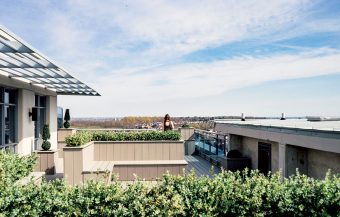
The construction sector in Serbia is among the strongest economic branches in terms of volume and has been recording significant growth in real estate development. According to global statistics, the construction sector occupies a leading negative position in almost everything in the context of the impact on the environment and climate, with almost 50 per cent share when it comes to energy consumption, emissions of harmful gases, the use of natural resources (of which drinking water makes 14 per cent) and the quantity of generated waste. Managing the construction sector sustainably is important for a more sustainable future. Dragana Korica, executive director of the Green Building Council of Serbia, speaks for Energy Portal magazine about the Council and its contribution towards such a future.
The Green Building Council of Serbia was founded by eight companies from the construction sector in 2010. The companies shared a great awareness and values, recognizing that the turn towards sustainability was inevitable, as was responsibility towards society, the living and the built environment. Following the direction of the construction sector, which was already developing fast in other parts of the world, but also the desire to achieve a necessary and noticeable positive effect on their local environment and community, led the Council to join the global green building movement and thus improve its original goals.
“Today, the Council has over 50 members who know why building green is an inevitable and irreversible direction that we should all strive for and who pave that way with their membership and activities under the Council’s auspices. The Council has come a long way since its establishment. In the past 14 years, many things have changed, both locally and globally, and the topics of climate change, green transition and sustainability have come to the forefront as crucial and inevitable during that period. We have learned that we must face these pressing issues together on a planetary level”, says Ms Korica.
IN FOCUS:
- SOCIAL NETWORKS FROM A DIFFERENT ECO-ANGLE
- ENERGETIK ENERGIJA CONQUERS THE REGIONAL MARKET
- SOLVING PROBLEMS WITH HIGHER HARMONICS

Membership in the World Green Building Council made it possible to keep abreast of current issues and problems, find solutions and keep up with the latest knowledge and innovations related to a sustainable built environment. At one point, the Ministry of Construction, Transport, and Infrastructure appointed the Green Building Council of Serbia as the “umbrella organization for all issues related to green construction”, which they do not take lightly, but it is a validation of their work so far and achieved results.
In addition to being a member of the World Green Building Council, this organization is also a member of the European Regional Network (ERN), in which they actively participate. Their representatives from the Serbian chapter of the Green Building Council participate in the thematic working groups and events held by the World Green Building Council, which they also organize locally, such as World Green Building Week. Furthermore, their members give their expert contributions to publications and international projects in which they participate through the ERN. This global network allows them to implement all the relevant and current trends locally, which are related to the necessary transition of the construction sector and the built environment.
“Of course, outside of this framework, we also have direct communication and inter-member cooperation with many individual European councils. For example, through this form of direct cooperation, we recently ensured that two members of the Green Building Council of Serbia went through certification training of the German DGNB certification system for free”, Ms Korica adds.
Promotion of sustainability

Construction products rely heavily on natural resources. Global statistics say that this reliance amounts to 50 per cent, while natural resources are decreasing. One of the Council’s basic roles is to promote the necessary transformation of the construction sector in the direction of sustainable construction and highlight the fact that this sector is one of the most receptive to the implementation and innovation of the circularity model. A change is necessary for the sake of energy and emissions related to the environment and also because of the ongoing crisis caused by the lack of energy and the overrepresentation of emissions. Such promotion is implemented through conferences, panels, workshops and webinars.
The Council also participates in the activities of other organizations and institutions with which it shares related topics, as well as with state institutions, ministries and all relevant stakeholders. Furthermore, the Council is involved in monitoring regulations, especially draft laws, and regulations.
Prepared by: Katarina Vuinac
Read the story in the new issue of the Energy portal Magazine SUSTAINABLE ARCHITECTURE AND FINANCING OF GREEN CONSTRUCTION



